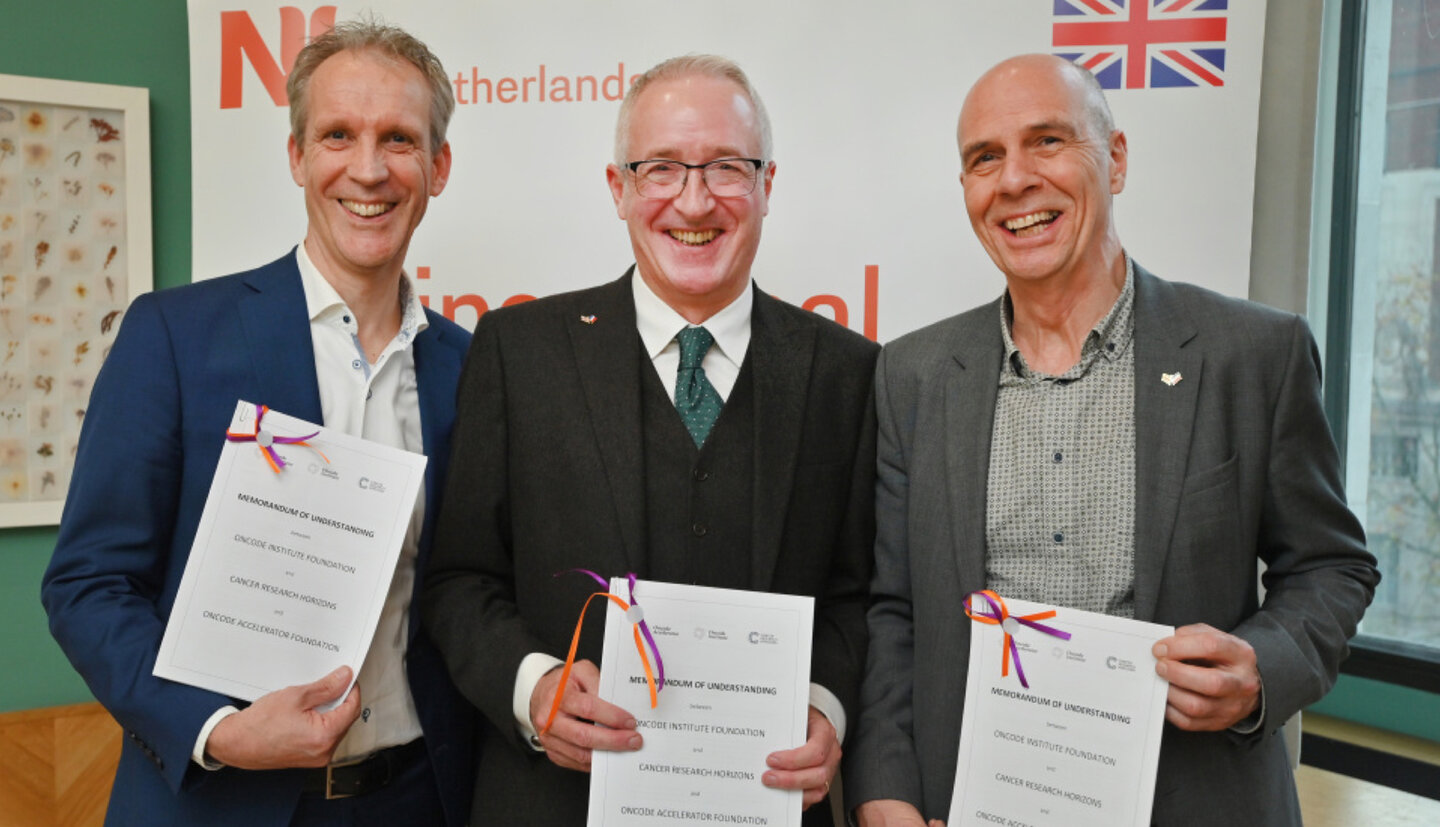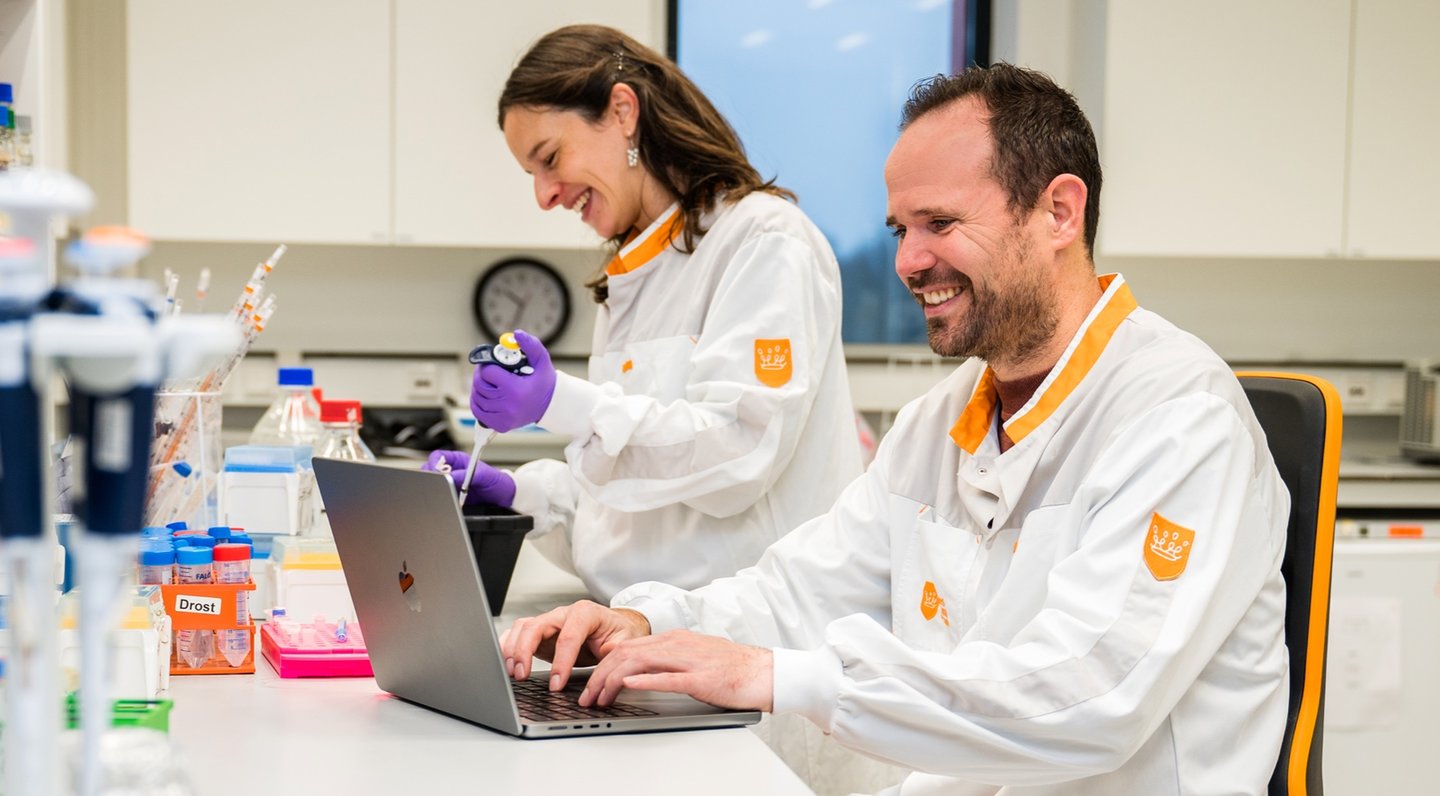Dual Interview
08
One Mission, Three Forces: Advancing Oncology Through Collaboration
In this interview, Tony Hickson and Jan Paul Medema share their insights on advancing oncology through collaboration.
In oncology, progress is faster and more effective when we work together. National and international partnerships, between public and private parties, are essential for translating fundamental scientific discoveries into clinical practice. With the signing of a memorandum of understanding last December, Oncode Institute and Cancer Research Horizons welcomed us, Oncode Accelerator, as a new member in their longstanding collaboration. It further solidified our shared mission, and set us on the path to becoming a truly comprehensive partnership in the field of oncology. In this interview, Tony Hickson, Chief business officer for Cancer Research Horizons, and Jan Paul Medema, Scientific Director of Oncode Institute, discuss the key ingredients for success, the potential impact of the partnership, and the challenges the biotech sector faces in the current day.
Tony: “Cancer Research Horizons is the innovation and impact arm of Cancer Research UK. My team helps researchers patent their ideas and collaborate with industry and investors to advance their innovations. I think Jan Paul's work differs in that Oncode Institute is a virtual institute with a selected group of scientists.”
Jan Paul: "That’s exactly right. We are an institute that combines 62 carefully selected top cancer researchers working at 13 partner institutes in the Netherlands. While we align closely with Cancer Research Horizons in our efforts for research valorization, our approach emphasizes spin-outs and public-private collaboration to maximize impact. Cancer Research Horizons, with its own drug discovery team, can further develop discoveries in-house, advancing them closer to the clinic.”
Bringing clinical innovations to life is a huge challenge, but collaboration helps. By sharing risks and pooling resources, we can achieve more for patients and society.
Tony Hickson, Chief Business Officer of Cancer Research Horizons
Tony: “Bringing clinical innovations to life is a huge challenge, but collaboration helps. By sharing risks and pooling resources, we can achieve more for patients and society. For instance, Oncode Accelerator's fantastic access to innovative in vitro models like organoids, combined with Cancer Research Horizons in vivo models, creates a powerful toolkit. We can offer our researchers a broader range of technologies, which accelerates progress to the clinic."
Tony: "Creating a major success takes time – sometimes years. Cancer Research Horizons has helped bring several drugs to market, but one of the longest and most impactful journeys is that of the PARP inhibitor based therapies. Initially, these drugs were considered too toxic, and it took time to understand how they could be effective in treating cancer. The early patents were filed in the 90s, but it took until 2014 for the first PARP inhibitor to be approved in the US and Europe, when they could start making a big impact on patients. It’s been a long road, but our perseverance paid off."
Jan Paul: "Tony’s story really highlights the importance of connecting academic research to clinical practice. In my time as Oncode Institute’s scientific director I witnessed a great example as well: the brain cancer project led by Jeroen de Ridder. What started as a collaborative idea turned into a transformative tool combining next gen sequencing and AI, allowing the identification of brain tumor subtypes during surgery, in real-time. This technique is now standard care at the Princess Máxima Center for pediatric oncology and other hospitals, reducing the need for additional surgeries, which is a huge benefit for patients. Albeit on a smaller scale by sheer patient numbers, this example shows that our valorization efforts focus on patient impact. While economic outcomes can be important, our main goal is clinical benefit for patients with cancer. That’s what drives our work and what our investors look for. I’m certain that is true for Cancer Research Horizons as well."
Tony: "Definitely!”
Tony: “I like partnerships that are seamless, and this one has been exactly that. Our alignment and shared goals have made it easy to work together, and make us eager to work through challenges. For example, forming a start-up together was a difficult trajectory, but we all wanted the same outcome: getting the treatment to market. So we made it happen. The potential we’re unlocking together is exciting, and it still feels like we’re just getting started."
Jan Paul: “I've learned that partnering with Cancer Research Horizons makes a real difference. They bring a broader scope, and by integrating our researchers with Cancer Research Horizons’ drug discovery team, we’re accelerating translation efforts. We've already co-invested in a couple of companies, pushing them to the next stage. Our shared vision and smooth collaboration are key to achieving our goals. Oncode Accelerator should fit perfectly into this dynamic.”

Jan Paul Medema, Tony Hickson and Mark Krul, COO of Oncode Accelerator Foundation, with the signed the memorandum of understanding
Jan Paul: "I hope Oncode Accelerator will become a platform for quickly evaluating candidates emerging from Cancer Research Horizons’ drug discovery arm and Oncode Institute’s fundamental research. The real benefit is speeding up the journey from lab discoveries to clinical application."
Tony: "Absolutely. Before this role, I worked in valorization at Imperial College London, focusing on engineering and physical sciences. It showed me what genuine collaboration looks like. In biomedical science, pharma often funds scientists to do work for them, but in engineering, it’s more of a true back-and-forth, iterative process. With Cancer Research Horizons, Oncode Institute, and Oncode Accelerator, we have that genuinely collaborative spirit, and the potential to cultivate it. Our goal is to offer scientists an end-to-end solution, and we're getting closer to that."
I hope Oncode Accelerator will become a platform for quickly evaluating candidates emerging from Cancer Research Horizons’ drug discovery arm and Oncode Institute’s fundamental research.
Jan Paul Medema, Scientific Director of Oncode Institute
Jan Paul: “Yes, it’s a dream opportunity. We have brilliant scientists in both the Netherlands and the UK, but they’re often confined by their specializations. Most fundamental researchers don’t move their work to clinical application unless encouraged to do so. We need to provide a clear path and help them advance their discoveries. Collaboration, not just nationally but also internationally, is key. Making an impact for patients should never be limited by national borders."

Jarno Drost
Tony: "Years ago, the focus was on obtaining IP from research and quickly licensing it to industry. Now, industry often steps in at later stages in the R&D process and is more selective. At the same time, there's been a shift in academia. The newer generation of scientists is more often exposed to entrepreneurship and accelerators, making them more driven to create start-ups and make an impact outside academia. With both the market needs and academic interest evolving, we need to build the platforms and capabilities to bridge that gap. That’s what we’re trying to achieve together."
Jan Paul: "Next to that, pharma is also realizing that blockbuster drugs aren’t as easily developed as before. They need next level academic input to keep their innovation pipelines moving. It’s great to see pharma reaching out to us and Oncode Accelerator and Cancer Research Horizons, recognizing that we bring that next level of true innovation."
Tony: “I'd like to add that our mission is also about addressing neglected areas like rare pediatric cancers or cancer prevention, where market incentives don’t align. To bring these solutions to market, we need collaboration between the charity sector and public funding initiatives, especially when industry interest is lacking."
Jan Paul: "Cancer Research Horizons and Oncode Institute have been collaborating for years, with several joint projects already underway, including start-ups, shared facilities, and research projects. Our connection 5-6 years ago sparked multiple research lines, driving them toward clinical impact. We hope Oncode Accelerator will enhance this ecosystem even further."
Tony: "We’re very pleased with the partnership. I believe our 'team science' approach—working together internationally and leveraging our complementary strengths—will only grow. It’s ironic that in a world that seems to become more isolationist, we’re breaking down barriers and realizing that collaboration is key to solving big challenges like cancer.”
Jan Paul: “Exactly. Let’s keep challenging isolationism and choose collaboration instead. If we make that shift, we’ve already succeeded. It’s one of the most crucial factors in driving real patient impact, and that’s ultimately what matters most.”
About
Tony Hickson
Tony is the chief business officer for Cancer Research UK and Cancer Research Horizons. He leads the Commercial Partnerships team responsible for the commercialisation of IP from Cancer Resarch UK-funded projects, new start-up creation, licences and corporate alliances.
About
Jan Paul Medema
Oncode Investigator Jan Paul Medema is the Head of Oncode Institute and chair of its Research Management Committee. He is also group leader at Amsterdam University Medical Centers and Professor Experimental Oncology and Radiobiology at the University of Amsterdam.
Credits: interview by Iris Gombert and Peter Thijssen; photography by Marloes Verweij, Laloes Fotografie